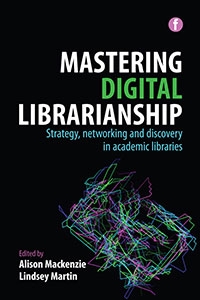
Primary tabs
You don't need to be an ALA Member to purchase from the ALA Store, but you'll be asked to create an online account/profile during checkout to proceed. This Web Account is for both Members and non-Members. Note that your ALA Member discount will be applied at the final step of the checkout process.
If you are Tax-Exempt, please verify that your account is currently set up as exempt before placing your order, as our new fulfillment center will need current documentation. Learn how to verify here.
- Description
- Table of Contents
- About the authors
- Reviews
This book examines the changing roles of the librarian and how working within a rich digital environment has impacted the ability of professionals to develop the appropriate "know how," skills, knowledge, and behaviors required in order to operate effectively. Expert specialists and opinion makers from around the world discuss the challenges and successes of adapting existing practices, introducing new services, and working with new partners in an environment that no longer recognizes traditional boundaries and demarcation of roles. The focus is on three key strands where the impact of digital technologies is significant:
- "Communication" looks at how mobile devices are being used by LIS to enhance communication between services, staff, students and other stakeholder groups and investigates the extent to which LIS have successfully incorporated social media in their approach to managing customer enquiries
- "Teaching and Learning" examines the role of the librarian in engaging with, supporting and training Generation Y researchers in adapting to changing scholarly practices brought about by digitally rich research environment
- "Service Innovation" investigates the impact of the digital on collection management and user choice, the design and management of learning spaces to integrate mobile technologies and the impact this has on how librarians work within the space and support users in their effective use of technologies for communication, sharing and learning
Theme 1: Rethinking marketing and communication 1. Digital marketing in an outreach context - Alison Hicks 2. Reference 2.0: evolution of virtual reference services and social media - Dawn McLoughlin and Jill Benn3. A service in transition: how digital technology is shaping organizational change - Rachel Bury and Helen Jamieson Theme 2: Rethinking support for academic practice 4. The impact of open and digital content on librarians' roles in a learning and teaching context - Helen Howard5. Supporting early-career researchers in data management and curation - Joy Davidson6. Extending students' digital capabilities: the Digital Tattoo Project - Julie Mitchell and Cindy Underhill Theme 3: Rethinking resource delivery 7. Mobilizing your library - Dr. Kay Munro, Karen Stevenson, Rosemary Stenson and Wendy Walker8. ‘You might also be interested in . . .': improving discovery through recommendations - Lisa Charnock and Joy Palmer9 . Libraries and international branch campuses in the digital environment - Moira Bent
Alison Mackenzie
Alison Mackenzie is the Dean of Learning Services at Edge Hill University. Prior to taking up this post, she held the post of University Librarian at Bangor University, Wales, had a variety of roles at Manchester Metropolitan University and in her early career worked in art colleges and commercial practice. Alison has been active in SCONUL for a number of years, as a member and Chair of the Working Group on Information Literacy and as a contributor to the e-learning task-and-finish group. She has been active in the promotion of digital literacies and is currently managing a project on behalf of SCONUL on the development of digital scholarship skills by information professionals. She is currently Chair of the Performance Measurement and Quality strategy group.
Lindsey Martin
Lindsey Martin is the Assistant Head of learning Services at Edge Hill University, responsible for the learning technologies managed and supported by Learning Services. She has overall responsibility for the virtual learning environment and its associated systems, media development, classroom AV and ICT support and ICT staff development. Lindsey has worked in academic libraries for the past 19 years in a variety of roles including liaison librarian, research coordinator and manager of SOLSTICE, Edge Hill's HEFCE funded Center of Excellence for Teaching and Learning. She first became involved with e-learning as an academic librarian creating e-learning modules to support colleagues and students developing information and digital literacies. She is a member of the editorial board for the SCONUL Focus journal and secretary of the Heads of eLearning Forum Steering group (HeLF).
"Differentiating itself from countless other books available on digital librarianship Mastering Digital Librarianship provides a thematically focussed collection of research-based essays meant to provide academic librarians with a strategic primer for adapting library services for the digital age. In purposefully compiling essays contributed by academic librarians from universities around the world, editors Alison Mackenzie and Lindsey Martin, the Dean and the Assistant Head of Learning Services at Edge Hill University have leant a global perspective to the literature on digital librarianship ... Mastering Digital Librarianship is not a rudimentary overview of new technologies. No doubt to maintain the collection's purpose as a guide to key topics on digital librarianship for academic and professionals, the essays use empirical research and case studies written by seasoned professionals that quickly delve into their respective topics."
— Journal of Library & Information Services in Distance Learning
"Each chapter presents a concrete case study of one or another university and the principles guiding marketing, service provision or resource delivery activities. This is the most interesting feature of the book that turns it into an effective tool of best practice promotion and sharing."
— Information Research
"This complete tome is a great resource for librarians. Each chapter covers quite a different topic, but the book seamlessly joins them up under the context of ‘mastering digital librarianship'. Upon completion of the book the reader has had a very thorough introduction to many concepts and themes and through the variety of case studies and practitioner accounts is ready to take some of the potential discussions and solutions back into the workplace."
— MmIT Journal


